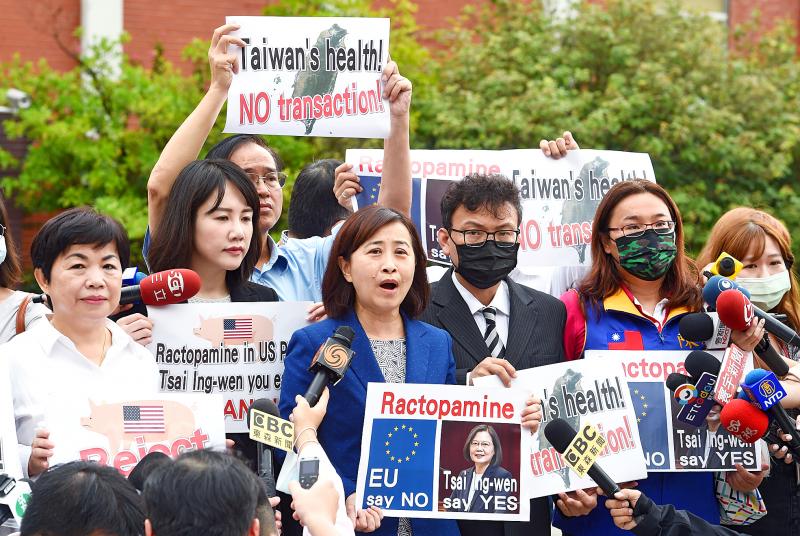Chinese Nationalist Party (KMT) lawmakers yesterday protested outside the legislative chamber against the government’s decision to lift a ban on US pork containing ractopamine while a Czech delegation led by Czech Senate President Milos Vystrcil was visiting.
The protest was directed at President Tsai Ing-wen (蔡英文) and the ruling Democratic Progressive Party, KMT caucus secretary-general Lin Yi-hua (林奕華) said, adding that the one standard the government has cited is not the only standard when it comes to the maximum safe residue level of ractopamine in pork and beef.
Lin was referring to the Codex Alimentarius Commission’s safety limit of 10 parts per billion in pork and beef, which officials have said would be used as a reference when setting local residue limits.

Photo: Liu Hsin-de, Taipei Times
Not only has the EU banned the use of ractopamine, it has also adopted a “zero tolerance” policy on ractopamine residue in imported meat products, she said.
If the EU can do it, Taiwan can do it too, she said, adding that as the nation welcomes the Czech delegation, the KMT hopes that the same standards used in the Czech Republic would be applied to the protection of Taiwanese’s health.
Separately yesterday, Premier Su Tseng-chang (蘇貞昌) was asked at an event in Taipei about several local governments saying that they would ban the sale of pork containing ractopamine.
The decision to ease restrictions on pork imports was based on scientific evidence and international standards, so he hopes that local governments can work in synergy with the central government in safeguarding public health and the local hog industry while bringing the nation in line with the international community, Su said.
Asked if the central government would reimburse pig farmers if they suffer losses because of the eased restrictions, Su said that the central government has allocated NT$10 billion (US$338.74 million) for subsidies to ensure that the hog industry is safe.
The fund would partially be used to upgrade facilities used by pig farmers and improve the industry as a whole, he said.
Some pig farmers have said that they would take to the streets to protest the easing of the import ban.
Su said that Taiwanese still prefer locally produced pork, which accounts for 91 percent of total pork sales, and people’s eating habits would not change with the lifting of the ban.
The World Organisation for Animal Health in June declared Taiwan free of foot-and-mouth disease, which is expected to greatly help the nation’s pork exports, he said.
Asked about the prospects of Taiwan signing a bilateral trade agreement with the US after the lifting of the import ban, the premier said the US had during negotiations asked the nation to lift the ban to remove the trade obstacle.
He compared Taiwan’s import ban with “fighting with one hand tied behind one’s back.”
It is to the US’ great delight that the nation has lifted the ban, so he believes that this would greatly benefit the nation in negotiations over its inclusion in international trade agreements, such as the Comprehensive and Progressive Agreement for Trans-Pacific Partnership, whose member states mostly allow the importation of US meat products, he said.

Taiwanese can file complaints with the Tourism Administration to report travel agencies if their activities caused termination of a person’s citizenship, Mainland Affairs Council Minister Chiu Chui-cheng (邱垂正) said yesterday, after a podcaster highlighted a case in which a person’s citizenship was canceled for receiving a single-use Chinese passport to enter Russia. The council is aware of incidents in which people who signed up through Chinese travel agencies for tours of Russia were told they could obtain Russian visas and fast-track border clearance, Chiu told reporters on the sidelines of an event in Taipei. However, the travel agencies actually applied

Japanese footwear brand Onitsuka Tiger today issued a public apology and said it has suspended an employee amid allegations that the staff member discriminated against a Vietnamese customer at its Taipei 101 store. Posting on the social media platform Threads yesterday, a user said that an employee at the store said that “those shoes are very expensive” when her friend, who is a migrant worker from Vietnam, asked for assistance. The employee then ignored her until she asked again, to which she replied: "We don't have a size 37." The post had amassed nearly 26,000 likes and 916 comments as of this

New measures aimed at making Taiwan more attractive to foreign professionals came into effect this month, the National Development Council said yesterday. Among the changes, international students at Taiwanese universities would be able to work in Taiwan without a work permit in the two years after they graduate, explainer materials provided by the council said. In addition, foreign nationals who graduated from one of the world’s top 200 universities within the past five years can also apply for a two-year open work permit. Previously, those graduates would have needed to apply for a work permit using point-based criteria or have a Taiwanese company

The Shilin District Prosecutors’ Office yesterday indicted two Taiwanese and issued a wanted notice for Pete Liu (劉作虎), founder of Shenzhen-based smartphone manufacturer OnePlus Technology Co (萬普拉斯科技), for allegedly contravening the Act Governing Relations Between the People of the Taiwan Area and the Mainland Area (臺灣地區與大陸地區人民關係條例) by poaching 70 engineers in Taiwan. Liu allegedly traveled to Taiwan at the end of 2014 and met with a Taiwanese man surnamed Lin (林) to discuss establishing a mobile software research and development (R&D) team in Taiwan, prosecutors said. Without approval from the government, Lin, following Liu’s instructions, recruited more than 70 software